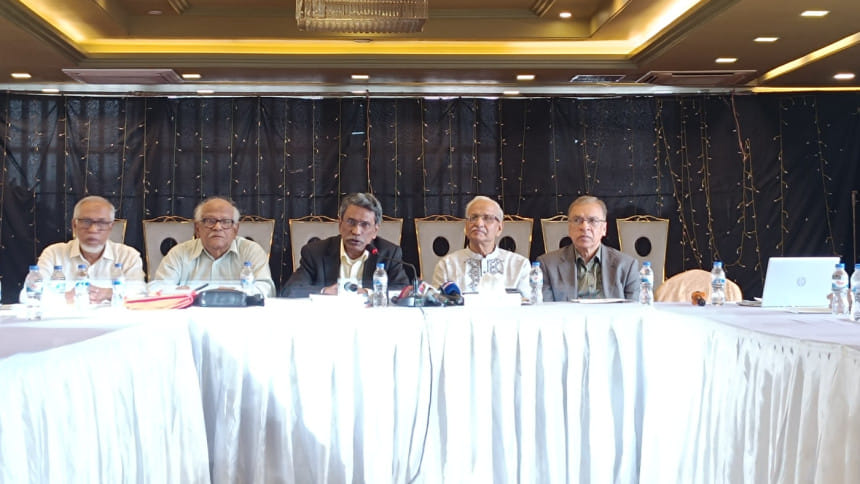Focus on key reforms only

Civil society representatives in a dialogue with the National Consensus Commission yesterday urged the interim government to prioritise essential reforms, saying it was unlikely that consensus could be reached on all issues.
At the same time, they also emphasised that political support was crucial to ensure the continuation of all reform efforts undertaken during this period.
Meanwhile, speakers also urged the interim government to refrain from amending the constitution, arguing that such actions must be left to elected representatives to avoid future complications.
These recommendations came during a discussion between the consensus commission and members of civil society at the Krishibid Institution of Bangladesh in the capital.
Maj Gen (retd) ANM Muniruzzaman, president of the Bangladesh Institute of Peace and Security Studies, "At this point, only necessary and practical reforms should be carried out. Overstepping that boundary could worsen an already complex situation."
He stressed that the transition to democracy must remain the central goal. "One of the core aspirations behind the July uprising was the restoration of democracy. The reforms we pursue must reflect that goal."
He added, "We can't assume that every reform is possible right now. We must prioritise those that are feasible. And those reforms will be sustainable unless it is backed by political consensus."
On constitutional amendments, he said, "Only those elected through a democratic process have the legitimate authority to amend it. If others attempt to bring major changes, it will create complications that will be difficult for the nation to overcome."
Senior journalist Basudeb Dhar, president of the Bangladesh Puja Udjapan Parishad, said the representation of minority voices was missing in the reform commissions.
"Secularism was in place during the previous regime, but only on paper. We've seen attacks during Durga Puja every year except last year."
To that effect, he questioned the impact of inserting pluralism into the constitution's fundamental principles if practical protection was still lacking.
He also argued that reforms could be pursued without altering the current constitution, as it is "rooted in the spirit of the Liberation War".
Prof Gitiara Nasreen, member of the Media Reform Commission and Dhaka University teacher, criticised the government's silence following attacks on the Women's Reform Commission.
"A commission was formed by the interim government. That very commission is now being directly attacked, but there has been no clear statement from the government. In this situation, it is difficult to remain hopeful.
"There can be differences of opinion, but the Women's Affairs Reform Commission worked with equal dedication, took everyone's views into account, and submitted a report. Then suddenly, demands are made to abolish that commission. It raises the question: are we not even able to create a space for rational thinking?"
She also expressed regret over women being sidelined from major issues despite their vital role in the recent mass movement.
Dhaka University Professor Samina Luthfa demanded that all political parties nominate at least 33 percent women candidates in the upcoming elections.
"Young women are now showing interest in entering politics like never before."
She criticised a long-standing trend where women lead protests but are later pushed back into domestic roles.
On the Women's Reform Commission, she said, "All parties must agree on core rights -- freedom of speech, human rights, women's rights, and the rights of minorities and marginalised groups. If any party disagrees, the NCC must engage them in dialogue."
Prof Ali Riaz, vice-president of the consensus commission, said the commission will inform the public about both areas of agreements and disagreement with political parties.
"This is essential for transparency and to help people make informed decisions in future political processes."
He added that consensus has been achieved on some fundamental issues; however, on other key matters, differences remain due to ideological positions.
"It is not realistic to expect full agreement on every issue."
He said civil society's views would be incorporated into both the proposed national charter and the commission's final report.
"We've repeatedly stated that dialogue with political parties alone is not enough. There must also be a shared understanding among citizens."
Iliara Dewan, former General Secretary of the Hill Women's Federation, called for constitutional recognition of the indigenous community and other marginalised groups.
The dialogue was also attended by consensus commission members Badiul Alam Majumdar, Safar Raj Hossain, Iftekharuzzaman, and Md Ayub Miah, along with Monir Haidar, special assistant to the chief adviser.
Among others present were former Justice MA Matin; former ambassador M Humayun Kabir; NSU Prof AKM Waresul Karim; BIGD researcher Mirza M Hassan; Ashrafun Nahar Misti, founder of the Women with Disabilities Development Foundation; and rights activist Sultana Raziya.

 For all latest news, follow The Daily Star's Google News channel.
For all latest news, follow The Daily Star's Google News channel. 



Comments